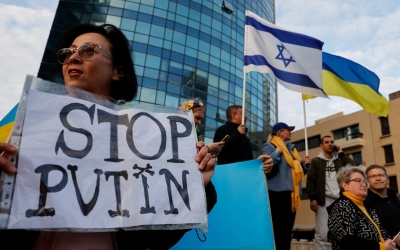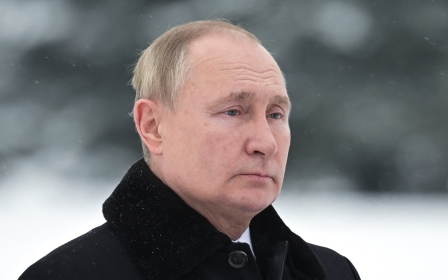Russia-Ukraine war: Israel readies itself for mass migration of Ukrainian Jews

It is likely that few of the 5,000 Ukrainian Jews seeking emigration to Israel using the Law of Return had any intention to do so before the war. Many only made the decision after five days of conflict that revealed Russia’s war is likely to stretch on far longer than some anticipated.
These would-be emigres ignored the early warnings by Israeli officials, who had urged Ukrainian Jews to leave discreetly, as Israel calling upon citizens of a foreign ally to move is a sensitive issue. Such appeals can be diplomatically harmful, and drive a wedge between Jewish citizens and non-Jewish citizens left with no such option.
Despite this, Israel has historically sought an opportunity in every crisis to offer itself as safe haven for the world’s Jews, in its never-ending demographic race with the Palestinians.
One of the most prominent examples was after the 2015 attack on a Jewish supermarket in France, when Benjamin Netanyahu angered European leaders by rushing to Paris and calling for mass migration to Israel. Less self-centred politicians leave it up to non-governmental organisations, like the Jewish Agency.
As the Russian invasion of Ukraine built up and then broke out, officials and NGOs began making appeals to the 200,000 Ukrainian Jews yet to do aliyah, the Jewish migration to Israel.
Weeks before the invasion, Israeli officials approached their counterparts in countries bordering Ukraine to secure a land route for Israelis and Jews to leave when the time comes. Not many chose this option while the time was still right; even fewer raised the option of relocating to Israel. Now the time is wrong, but the will is there.
Preparations being made
Behind the scenes, Israel is preparing for a big wave of immigration from Ukraine, much larger than the 3,000 who arrived last year. If it materialises, it will be handled using a “refugee” category, a status that allows special conditions.
A senior Israeli source told MEE that the state will offer single Ukrainian Jews escaping the war 6,000 shekels ($1,850), 11,000 per couple ($3,400) and 15,000 ($4,600) per family - sums unseen for aliyah outside of wartime.
Because they have had to leave everything behind, extra financing is provided in addition to the usual “absorption basket” - financial assistance offered to all immigrants.
Minister of Immigration and Absorption Pnina Tamano-Shata met on Monday with Finance Minister Avigdor Lieberman to discuss ways to facilitate and fund the process. She later published a statement stating the need to simplify and speed up the process of immigration for Ukrainian Jews in distress. No official financial plan has been published at this point.
In the current domestic atmosphere, where large parts of Israeli society are experiencing a general sense of dissatisfaction and feeling the bite of rising living costs, any decision made not only has financial implications but political ones, too. Financial support of all immigration tends to anger older Israelis, who feel it comes at their expense. Extra investment might provoke grudges and even protests. In any case, it will take time.
Questions over elegibility
If the expectation of the Jewish Agency for a massive wave of immigrants does materialise, it will be a twist in the story. Tamano-Shata, the Minister of Absorption, is Israel's first Ethiopian-born minister. For the first time in history, Israel will see a narrative of the “Ethiopians absorbing the Ukrainians” - and not vice versa - as one of her senior aides put it to MEE.
The terminology Tamano-Shata used in her Monday statement on facilitating Ukrainians’ arrival requires special attention. It refers specifically to “Jewish immigrants”. While 48,000 of the 200,000 Ukrainians eligible to apply are Jews according to religious law, the other 150,000 are not, but are still able to apply for aliyah under the Law of Return.
There is a clear distinction. The definition of “who is a Jew” according to the religious law is relatively simple: everybody born to a Jewish mother.
The Law of Return, on the other hand, is a secular Zionist law that offers a much broader definition of who is a Jew - having a Jewish grandfather suffices in this case.
The two laws, in fact, contradict each other. The religious one keeps Judaism closed to all others; the Zionist, broader law thinks of demography.
Talking to officials of the different immigration authorities, the plan seems to be speedy process for the first grouping of Jews, and more careful and tedious inquiry into the applications of those eligible with uncertain affinity to Judaism.
“We learned a lesson from previous waves of immigration from the former Soviet Union,” an official now involved in the process of immigration from Ukraine tells MEE.
The lesson has probably been very painful for Israeli authorities. Fifty refugees who managed to escape from the hell of the invasion were deported from Israel this week - they were not Jewish. In a press conference on Monday, Ukraine's ambassador to Israel expressed deep anger and disappointment with this conduct.
To rectify the inhumane wrong, a new plan has been drafted and approved by Interior Minister Ayelet Shaked, one dedicated to “preserving the Jewish nature” of the State of Israel. Under the plan, Israel vows to take no illegal action against Ukrainian nationals in the country, and all Israelis willing to host family and friends who escaped the war will be allowed to do so, providing they give a 10,000 shekel deposit. The Ukrainians they host must leave Israel after 30 days. There are no provisions in place in case the war lasts longer than that.
Basic infrastructure
The basic infrastructure for mass immigration has already been established.
The Ministry of Immigration and Absorption, the Jewish Agency and the International Fellowship of Christians and Jews, a veteran philanthropic organisation raising funds mainly from evangelical Christians all over the world to support Israel and finance immigration there, already operate an emergency centre for Ukrainian Jews in need of evacuation from the war.
The International Fellowship has published an emergency call to its supporters, saying: “The Ukrainian Jews desperately need your help to ensure basic needs, emergency aid and assistance with aliyah. Please help now.”
Nativ, an administrative unit at the prime minister’s office that encourages aliyah from former Soviet countries, said because of the critical situation, all those wishing to emigrate to Israel can now pass the necessary tests for eligibility in consulates in Warsaw, Budapest and Bucharest.
The Jewish Agency, meanwhile, sent several of its immigration experts to assist what is now described as “emergency immigration”.
The question remains: how will Israel interpret the notion of emergency when it comes to making the distinction between Jews, part-Jews and non-Jews under the current circumstances?
Israel already finds itself walking a moral tightrope between relations with Ukraine and dependence on Russia. If those calculations can be worked around by Israeli officials, then they can equally argue for cutthroat decisions on which refugees to let in, regardless of morality.
Middle East Eye propose une couverture et une analyse indépendantes et incomparables du Moyen-Orient, de l’Afrique du Nord et d’autres régions du monde. Pour en savoir plus sur la reprise de ce contenu et les frais qui s’appliquent, veuillez remplir ce formulaire [en anglais]. Pour en savoir plus sur MEE, cliquez ici [en anglais].






